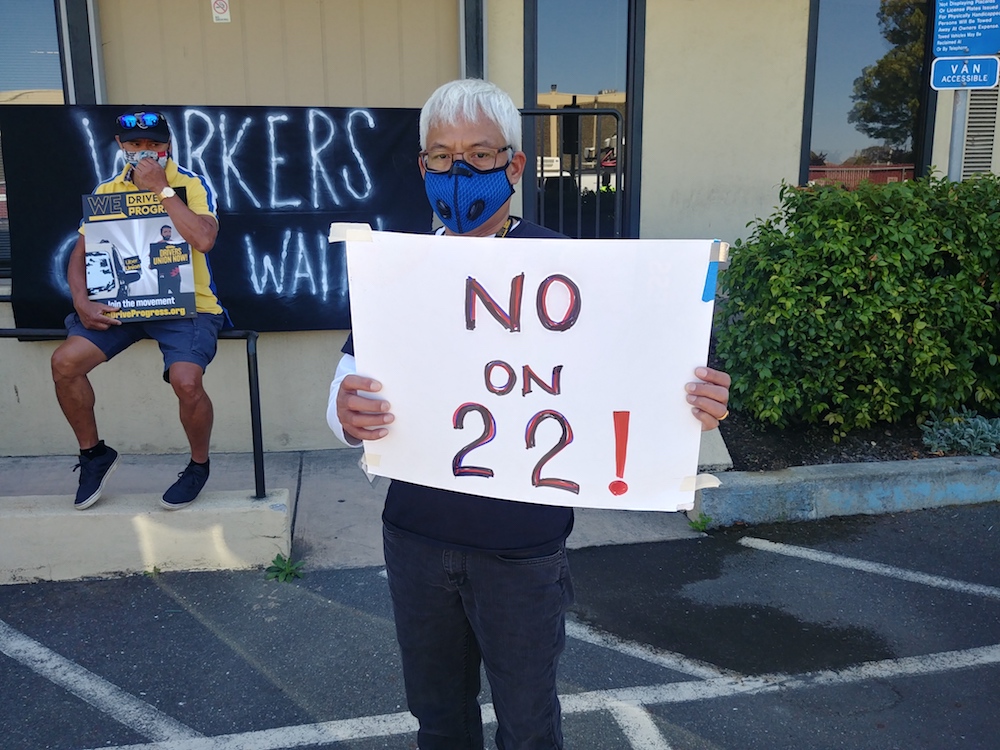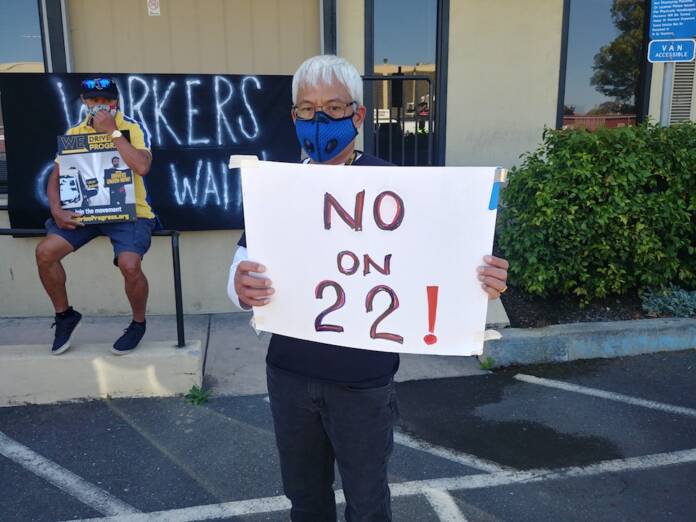On Thursday, about 50 Uber and Lyft drivers joined a caravan outside the Uber Greenlight Hub in Oakland demanding that the rideshare companies classify their drivers as employees and drop a ballot measure sponsored by Uber, Lyft, and Doordash, Prop 22, which seeks to exempt app-based companies from AB5 and would legally entitle them to classify their rideshare and delivery drivers as independent contractors.

The demonstration came the day after California Labor Commissioner Lilia Garcia-Brower filed two lawsuits against Uber and Lyft, alleging willful misclassification of workers as independent contractors and intentionally avoiding obligations under California law to adequately compensate their drivers.
Garcia-Brower is demanding that Uber and Lyft begin classifying their drivers as employees and is pursuing civil penalties against the two companies for failure to provide notice of employment-related information, and civil penalties as well as damages paid to drivers for failure to pay workers no less than minimum wage, failure to provide overtime compensation, paid rest periods, rest period premium pay, paid sick leave, failure to indemnify employees for business expenses, to provide itemized wage statements, and to timely pay earned wages during and after employment.
Uber and other proponents of Prop 22 point to a surveys by Benenson Strategy Group and therideshareguy.com which found that 69% of drivers performed other work in addition to driving as of December 2015, that 71% of Uber and Lyft drivers would rather be designated as independent contractors than employees. They say that 80% of all drivers work less than 20 hours a week, according to a report from the Berkeley Research Group.
“The vast majority of California drivers want to work independently, and we’ve already made significant changes to our app to ensure that remains the case under state law,” said Uber spokesperson Davis White. When three million Californians are without a job, our leaders should be focused on creating work, not trying to shut down an entire industry.”
Edan Alva, however, who drove with Lyft for six years until stopping on April 7th due to fear of the pandemic, has a different take on Uber and Lyft’s motive around Prop 22.
“Prop 22 is a proposition created by gig companies for gig companies. It’s not meant to take care of drivers, it’s to make sure gig companies can continue to exploit drivers in spite of existing labor laws,” said Alva.
The lawsuits against Uber and Lyft both allege that the companies do not sufficiently establish that their drivers are “free from the control and direction of the hiring entity in connection with the performance of the work,” the first tenet of the “ABC” test created by AB5, which determines whether a worker is an employee or an independent contractor.
The lawsuit states: “From its start up in 2009…Uber made a calculated business decision to misclassify its drivers as independent contractors rather than employees. At all times since the inception of the business, defendants have continued to misclassify their drivers as a means of unlawfully depriving these workers a broad array of statutory protections applicable to employees, in direct contravention to California law.”
It cites that Uber and Lyft determine what vehicles drivers may use, terminate or suspend drivers at any time based on terms set entirely by each company, that they set prices for rides and can change them at any time unilaterally, provide all training to drivers and do not require prior experience in order to drive for them, set and enforce specific rules that drivers must follow, including standards of “vehicle cleanliness, music, and prohibited topics of conversation with customer passengers,” among others.
The lawsuit further alleges that Uber and Lyft do not sufficiently prove that drivers “performs work that is outside the usual course of the hiring entity’s business,” and that their drivers are not engaged in their own trade transporting passengers, which are the second and third part of the “ABC” test, respectively.
For Uber specifically, the Garcia-Brower alleges that the company created two wholly owned subsidiaries, Rasier LLC and Raiser-CA LLC, to license Uber’s technology and hire drivers, acting as shell companies in a scheme designed to allow Uber to justify drivers’ status as independent contractors. In doing this scheme, the lawsuit alleges, Uber unlawfully sought to avoid granting drivers rights as workers under California law, including paying drivers at least minimum wage, paying overtime, paid rest periods, reimbursing drivers for business expenses, and reporting wage information to the California EDD (Employment Development Department).
Alva said that while he was driving with Lyft, he paid $35 for gas refills every two days, paid $1,200 a month for car maintenance, and last year spent between $1,000 and $1,500 on fixing flat tires. According to a 2018 study from the Economic Policy Institute, Uber drivers earned roughly $9.21 an hour after paying and vehicle expenses and commission fees to Uber.
“This work incurs a lot of cost. Maintenance to the car is significant, you’re doing it twice a month, it adds up to thousands of dollars,” said Alva. “Those things accumulate and are severe, especially if a driver gets into a car accident. For normal people who get decent pay and have all these worker protections, this stuff is no big deal. For people like us, who earn barely enough to exist in the Bay Area, we cannot stop working and nothing is left to save. When you are in that situation, tiny things like a flat tire can completely derail your life.”
For Hector Castellano, Lyft’s lack of paid sick leave has cost both him and his family. In October 2017, Castellano got in a car crash which totaled his car and injured his shoulder, requiring eight months of time off and $80,000 in healthcare costs. His daughter had to stop her college studies and work multiple jobs, including cleaning homes, to help pay the bills while Castallanos was unable to work.
“We are misclassified, so we don’t have any worker’s compensation, or paid sick leave, or medical insurance…during this pandemic, it’s crucial for us to get these benefits,” said Castellanos. “I had to pay for that, all my savings was finished.”
During the pandemic, those who depend on income from rideshare driving have suffered not only because rideshare demand has dropped substantially during the pandemic, but also because Lyft drivers are saddled with the burden of paying for their own PPE. Castellanos told me that he currently spends $10 a day on PPE, on top of the $50 a day he pays for gas and his $1,700 monthly bill for car maintenance. Drivers like Castellanos must buy PPE either from Lyft’s online storefront, or from other retailers.
“I have to buy Lysol spray online, and it’s hard to find.” said Castellanos. “Amazon, eBay, Target, it’s expensive. We have to spray down the car each [ride].”
Alva does not know exactly how much he is owed by Lyft, but he imagines it’s a fair amount.
“I can imagine if you calculate the value of all the benefits and every dollar they didn’t pay when I was working below minimum wage, I bet it adds up to quite a bit over the last six years,” said Alva.







